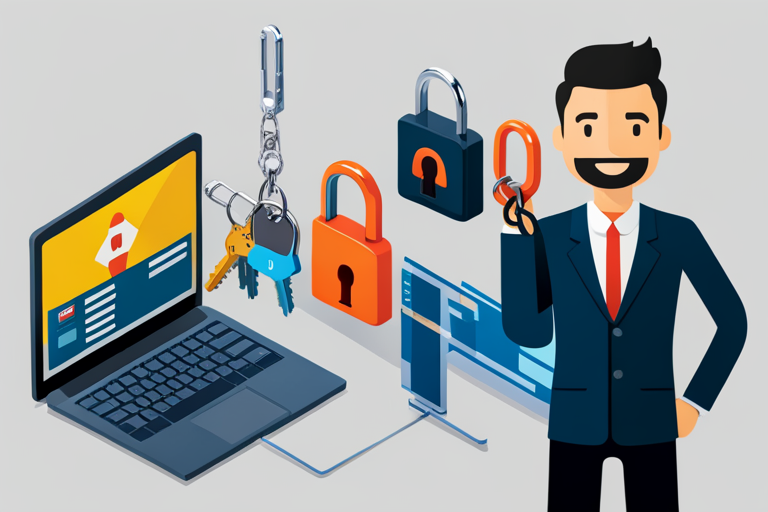Are you tired of trying to remember multiple passwords for all your online accounts? Do you struggle to come up with strong and unique passwords for each account? Password managers may be the solution to your problems.
These tools not only help you generate and store complex passwords, but also protect your sensitive information from hackers and cyber attacks.
In this beginner’s guide, we will explore the importance of strong passwords and the risks of weak passwords. We will also explain what password managers are, how they work, and the advantages of using one.
By the end of this article, you will have a better understanding of how password managers can simplify your online life and enhance your security.
Understanding the Importance of Strong Passwords
You need to make sure you’re using strong passwords, because hackers can easily guess common ones like ‘123456’ or ‘password’. Weak passwords can compromise the security of your online accounts, leaving your personal information vulnerable to theft and misuse.
That’s why it’s essential to use strong passwords that are difficult to guess and impossible to brute-force. A strong password is a combination of upper and lowercase letters, numbers, and symbols. It should be at least 12 characters long to ensure maximum security.
Avoid using common words, phrases, or personal information like your name, birthdate, or address. Instead, use a random combination of characters that are easy for you to remember but hard for others to guess. By using strong passwords, you can protect yourself from cyberattacks and keep your sensitive information safe and secure.
The Risks of Weak Passwords and Password Reuse
Don’t let your online security be compromised by using weak passwords or reusing them across multiple accounts.
Weak passwords are easy for hackers to crack, leaving your personal information vulnerable to theft.
Using the same password for multiple accounts puts all of those accounts at risk if one is breached.
Additionally, weak passwords and password reuse can lead to identity theft.
If a hacker gains access to your email or social media accounts, they can easily impersonate you and gain access to other personal information, such as your banking or credit card information.
It’s important to take the necessary steps to protect yourself online, including using a password manager to generate and store strong, unique passwords for each of your accounts.
What are Password Managers and How Do They Work?
By using a password manager, it becomes much easier to create and store strong, unique passwords for all of your accounts, ultimately enhancing your online security.
Essentially, a password manager is a digital tool that generates, stores, and manages complex passwords for you. When you sign up for a new account or change your password, the password manager will automatically generate a strong, unique password for you and store it securely in an encrypted database.
The next time you need to log in to that account, the password manager will autofill your credentials, so you don’t have to remember them yourself.
Some password managers even offer additional features like two-factor authentication and password strength analysis to further enhance your online security.
Overall, password managers make it much easier to maintain strong passwords across all of your accounts and reduce the risk of password-related security breaches.
Advantages of Using a Password Manager
With a password manager, you can sit back and relax while all your login credentials are organized and secured in one place.
One of the biggest advantages of using a password manager is convenience. You don’t have to remember multiple passwords for different accounts and can rely on the manager to generate strong and unique passwords for you. Most password managers also offer browser extensions and mobile apps, making it easy to access your saved passwords across all your devices.
Another advantage is security. Password managers can help protect against hacking and identity theft by creating strong passwords and storing them securely. Many password managers also offer two-factor authentication, adding an extra layer of security to your accounts.
In addition, since you only need to remember one master password for your manager, you can choose a strong and complex password without having to worry about forgetting it.
Overall, using a password manager can save you time and stress while keeping your accounts secure.
Types of Password Managers
There are various options available when it comes to choosing a password manager, each with its own unique features and benefits. The most common types of password managers include cloud-based, local, and browser-based password managers.
Cloud-based password managers store your passwords on their servers, which means you can access your passwords from any device with an internet connection. They also offer features like automatic syncing, which keeps your passwords up-to-date across all your devices.
Local password managers store your passwords locally on your device, which means you have complete control over your passwords and they cannot be accessed by anyone else.
Finally, browser-based password managers are built into your web browser and can automatically fill in your login details when you visit a website. They are easy to use and require no installation, but may not offer as many features as other types of password managers.
Ultimately, the type of password manager you choose will depend on your personal preferences and needs.
Popular Password Managers on the Market
Now that you know about the different types of password managers available, it’s time to explore some of the most popular options on the market. These password managers have gained their popularity due to their reliability, security measures, and user-friendly interfaces.
One of the most popular password managers is LastPass. It offers a free and premium version, and it works across multiple devices and platforms. LastPass encrypts your data and stores it online, ensuring that only you have access to your passwords.
Another well-known password manager is 1Password. It has a simple and intuitive interface that allows you to store passwords, credit card information, and other sensitive data. 1Password also offers a family plan and works on multiple devices.
Other popular password managers include Dashlane, Keeper, and RoboForm, each with its unique features and benefits.
By using a popular password manager, you can rest assured that your passwords and sensitive information are secure and easily accessible whenever you need them.
Choosing the Right Password Manager for Your Needs
To ensure that your sensitive information stays secure and easily accessible, you’ll want to choose the password manager that best fits your specific needs.
First, consider the features that are important to you. For example, some password managers offer two-factor authentication for an extra layer of security, while others allow for easy sharing of passwords with family or coworkers. Additionally, look for a password manager that has a user-friendly interface that you feel comfortable navigating.
Next, consider the platforms you use most frequently. If you primarily use Apple devices, you may want to opt for a password manager that is built into the Apple ecosystem. Alternatively, if you use a combination of Windows and Android devices, you’ll want to find a password manager that is compatible with all of your devices.
Overall, the key is to do your research and choose a password manager that aligns with your specific needs and preferences.
Frequently Asked Questions
Can password managers guarantee 100% security for my online accounts?
No, password managers cannot guarantee 100% security for your online accounts. However, they provide a safer option than reusing weak passwords or storing them in plain text. Always enable two-factor authentication for added security.
What happens if I forget my master password for the password manager?
If you forget your master password for a password manager, you won’t be able to access your stored passwords. It’s important to remember this password or have a backup plan in place.
Can I use a password manager on multiple devices?
Yes, you can use a password manager on multiple devices. You just need to download the app and sign in with your account. Your saved passwords will sync across all your devices automatically.
Are password managers compatible with all web browsers and operating systems?
Yes, password managers are typically compatible with all major web browsers and operating systems. However, you should double-check the specific requirements before downloading to ensure it will work with your devices.
How often should I change my passwords when using a password manager?
You should change your passwords regularly, regardless of whether you’re using a password manager or not. However, with a password manager, you can make your passwords stronger and more complex, and change them more frequently without the hassle of remembering them all.
Conclusion
So, there you have it – a beginner’s guide to password managers. Remembering and managing strong passwords can be a daunting task, but with the help of password managers, it can be made easier.
By using a password manager, you can ensure that all your accounts are secured with unique and complex passwords that are difficult to crack. Using a password manager not only saves you time and effort but also protects your sensitive information from cybercriminals.
With different types of password managers available in the market, you can choose the one that best suits your needs. So, don’t wait any longer – start using a password manager today to safeguard your online accounts and stay protected from cyber threats.

Hey there, tech enthusiasts! I’m your go-to content writer, delving into the fascinating world of technology hacks. Get ready to unlock mind-blowing secrets and discover innovative solutions through my engaging and insightful blogs.


